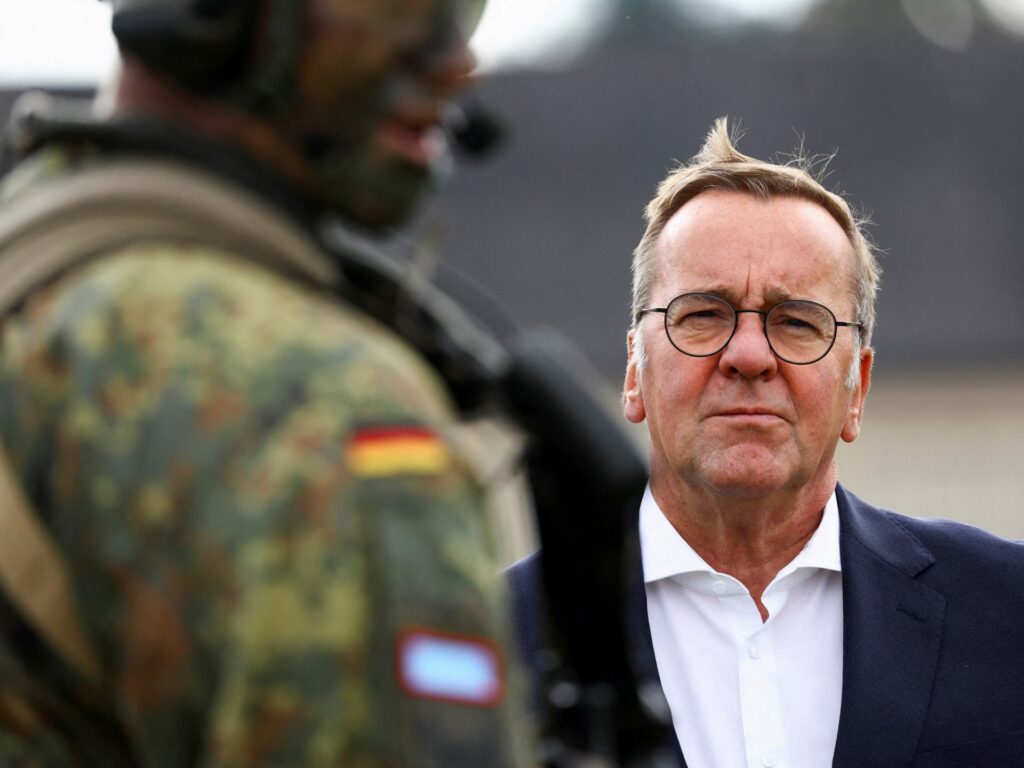
Germany says it assumes that damage caused to two telecommunication cables in the Baltic Sea is an act of sabotage as European nations condemn the alleged Russian attacks on their “security architecture”.
German Defence Minister Boris Pistorius told reporters in Brussels on Tuesday that no one believes the cables between Finland and Germany and between Sweden and Lithuania were accidentally severed.
“We have to say, without knowing exactly who it came from, that this is a hybrid action. We also have to assume, without knowing it yet, that it was sabotage,” he said.
The first of the suspected attacks was of an internet link between Lithuania and the island of Gotland in Sweden on Sunday morning, followed by a damaged cable between Helsinki and the German port of Rostock early on Monday, according to local operators.
The latter was the only direct connection of its kind between Finland and Central Europe, spanning nearly 1,200km (730 miles).
The Swedish Prosecution Authority said on Tuesday that it had opened an investigation into “sabotage” after the two undersea cables were cut.
“The offence is currently being investigated as sabotage. The preliminary investigation is ongoing and at an early stage. There is no further information to share about the investigation at this time,” prosecutor Henrik Soderman said in a statement just hours after neighbouring Finland said it had also opened a police investigation.
NATO members were jointly assessing what happened, a spokesperson for the Lithuanian armed forces said, adding that naval forces have stepped up their patrols.
“It’s not a partial damage. It’s full damage,” said a spokesperson for Arelion, the owner and operator of the cable linking Lithuania and Sweden.
Cinia, which owns the cable linking Finland and Germany, said it was not possible to say what might have caused the breach until repairs had started.
The European Union’s top diplomat said on Tuesday that it was not possible to attribute the cutting of the cables to anyone.
“We cannot attribute these incidents to anyone. It would be irresponsible from my side to attribute this, let’s say, incident or accident or whatever you want to call it, to anyone. It would be putting wood to the fire. That is not my intention,” Josep Borrell said during a news conference in Brussels.
While Dutch Defence Minister Ruben Brekelmans said he had no specific information about who was to blame, he added: “We see increasing activity of especially Russia on our seas, aimed at espionage and possibly even sabotage of our vital infrastructure.”
The stretch of water has previously been the site of suspected attacks. In 2022, explosions ruptured the Nord Stream gas pipelines, which had carried Russian gas exports, hastening Europe’s switch to other energy suppliers after Russia’s full-scale invasion of Ukraine.
On Tuesday, the foreign ministers of Germany, France, the United Kingdom, Italy, Spain and Poland said in a joint statement that European “common security is challenged as never before” as “Russia is systematically attacking European security architecture”.
They did not specifically lay the blame for the severed cables on Moscow but said Russia is increasingly deploying “hybrid activities” against NATO and the European Union amid the expanding fallout of the war with Ukraine, which marked its 1,000th day on Tuesday.
The diplomats said strengthening NATO may in “many cases” require expenditures beyond 2 percent of its members’ gross domestic product, NATO’s current goal, and they promised to “use all levers available”, including economic and financing power.
Russia is increasingly relying on partners like Iran and North Korea to sustain its war effort, they said.
The foreign ministers of Finland and Germany also said late on Monday that they were “deeply concerned” about the severed underwater cable between their countries. Russia has not directly commented on the incidents.
Moscow has accused Washington of ordering the attacks on the Nord Stream pipelines, which carried Russian gas to Germany under the Baltic Sea. German prosecutors have issued an arrest warrant for a Ukrainian man over those blasts.
Meanwhile, Russia continues to launch ground and air attacks inside Ukrainian territory, including strikes on energy infrastructure.
The attacks have led to widespread power outages, which have in turn affected internet and communications lines.









More Stories
Prosecutors tell judge they oppose dismissing President-elect Trump’s NY conviction
Pasando el día con un paletero
Trump picks pro-tariff billionaire Howard Lutnick for US commerce secretary